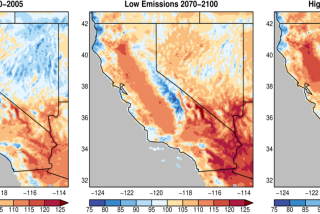Judge Rejects Unocal Charges
A judge on Wednesday dismissed federal charges that accused Unocal Corp. of misleading California regulators and gaining an illegal monopoly over the state’s unique formula for cleaner-burning gasoline.
The ruling, issued by an administrative law judge at the Federal Trade Commission, was a setback for rival oil companies, consumer advocates and California Atty. Gen. Bill Lockyer. They had supported the FTC’s contention that Unocal’s allegedly anti-competitive behavior could cost California motorists as much as $500 million a year in gasoline prices.
U.S. Administrative Law Judge D. Michael Chappell found that Unocal’s actions were immune from antitrust prosecution. He cited a 1961 doctrine meant to protect the ability of companies to lobby government and legislative bodies.
The controversy dates from 1990 to 1994, when Unocal and other oil companies were working with the California Air Resources Board to fashion a standard for cleaner-burning gasoline.
In its complaint filed in March, the FTC said Unocal hid from others in the group the fact that it had applied for patents on key aspects of the new fuel blend. Unocal also led regulators and other companies to believe that it would give up any proprietary interests it held for the new fuel formula, the complaint said.
The El Segundo company “obtained unlawful market power through affirmative misrepresentations, materially false and misleading statements and other bad-faith, deceptive conduct that caused CARB to enact regulations that overlapped almost entirely with Unocal’s pending patent rights,” the FTC said.
California regulators have said they would have adjusted the formula had they known Unocal had patent rights.
Unocal spokesman Barry Lane noted that Wednesday’s ruling followed civil court decisions upholding its patents and clearing the company of wrongdoing.
“We hope that the ruling’s going to resolve the issue before the FTC,” Lane said.
The FTC staff can appeal the judge’s decision to the full commission. The commission last March approved the filing of the FTC’s complaint against Unocal, seeking to bar Unocal from pursuing royalties for the disputed patents.
“We’re hopeful that this goes to the full commission, and that the outcome will be different,” said Lockyer spokesman Tom Dresslar. “They got those patents by subterfuge. And it has a real-life effect on every driver in California.”
A chorus of others criticized the judge’s ruling.
David Hackett, an oil industry consultant familiar with California’s gasoline market, said refiners paid Unocal royalties of as much as 3.4 cents a gallon to use its formula -- costs that were passed on to motorists.
Other refiners incur higher expenses to “blend around” Unocal’s patents, he said.
“Unocal is probably doing the Snoopy dance of joy right now,” Hackett said. “But the fact of the matter is that it raises the price of gasoline ... and if the FTC had knocked the patents out, it would have made a measurable difference.”
Rival oil companies said the ruling simply said Unocal had an immunity from prosecution.
“This ruling does not absolve Unocal of any wrongdoing,” said Mary Rose Brown of Houston-based Valero Energy Corp. “It just means that it can’t be held accountable for it.”
ChevronTexaco Corp. of San Ramon continues to believe “the patents obtained by Unocal on reformulated gasoline are invalid and should be unenforceable as a matter of patent law,” spokesman Jeff Moore said.
Unocal spokesman Lane said several oil companies had acknowledged in court testimony that they could work around Unocal’s patents to develop similar fuels at little or no extra cost. The claim of higher costs to consumers, he said, “is a sad song they’ve been singing from the get-go.”
Unocal expects its patents to yield $75 million to $150 million a year in royalty fees if refineries nationwide take out licenses, Lane said.
Unocal’s patents have been the focus of legal wrangling since their existence was unveiled in 1995. The company has emerged victorious in every instance, with favorable rulings from the U.S. District Court, the U.S. Court of Appeals and the U.S. Supreme Court.
The legal challenges have come from Exxon Mobil Corp., ChevronTexaco, Royal Dutch/Shell and BP. In 2001, the U.S. Supreme Court let stand Unocal’s lower court victories. In one of those cases, Unocal received $91 million from the four major oil companies to cover royalty payments of 5.75 cents a gallon over five months in 1996.
ExxonMobil appealed for intervention from the FTC and the U.S. Patent and Trademark Office, and it and other oil companies have refused to pay additional royalties until those cases are resolved. The office is reviewing several of Unocal’s gasoline patents.
More to Read
Inside the business of entertainment
The Wide Shot brings you news, analysis and insights on everything from streaming wars to production — and what it all means for the future.
You may occasionally receive promotional content from the Los Angeles Times.










